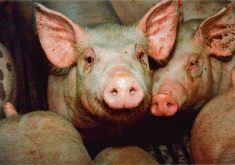An outbreak of vesicular stomatitis (VS) in livestock in New Mexico has prompted Canada to block the entry of horses from that state.
As of last Friday (May 4), horses originating from New Mexico will not be permitted to enter Canada — except for Canadian horses returning from that state, subject to "additional import requirements."
Furthermore, the Canadian Food Inspection Agency said, all horses entering Canada from the U.S. must now be accompanied by "official U.S. documents" certifying that they haven’t been in New Mexico within the previous 21 days.
Read Also

Canadian Cattle Association welcomes reopening of Chinese market to Canadian beef
The Canadian Cattle Association (CCA) says the Chinese market will re-open to Canadian beef — though details are still scant.
Canada’s last domestic case of VS was diagnosed in 1949. The country is now considered free of the disease, and an outbreak could mean losses of markets for live animals, meat and animal genetics, CFIA said.
VS, a reportable disease in Canada, is a viral disease affecting horses, ruminants, members of the deer and llama families, and hogs.
The disease is considered most significant because it closely resembles foot and mouth disease, which affects ruminants and hogs. VS causes mild fever and the formation of blister-like lesions on the inside of the mouth, and on the lips, nose, hooves and udder.














